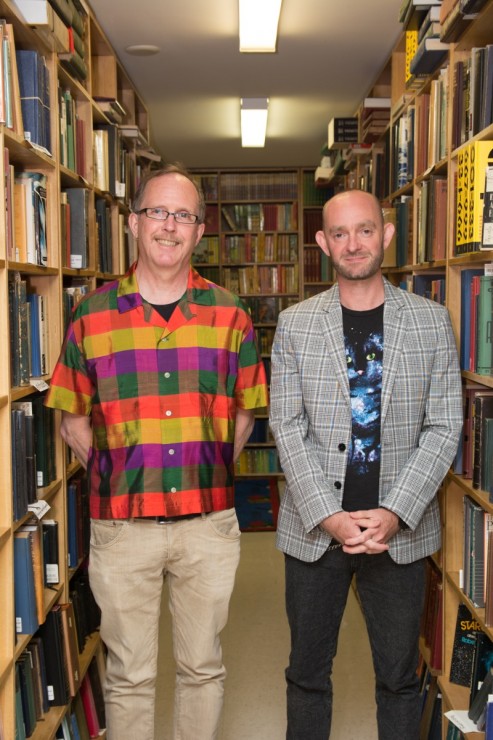
John Barton (left) and Chris Hutchinson (right) launched their books at Russell Books on June 4. –Hugo Wong (photo)
John Barton and Chris Hutchinson have both made their mark on the Canadian and Victorian literary scenes in the past; Hutchinson has published three books of poetry, and Barton has written 10 books over his 30-plus year career and is the current editor of the Malahat Review. The two released their brand new books in a joint event on June 4 at Russell Books.
Barton’s book, Polari, is a collection of poems that explores how we construct and code language, while Hutchinson’s poetic novel Jonas in Frames is a depiction of a fractured mind lost in an increasingly fractured world. Before the event, I had a chance to sit down and chat with them about their work, the problems with prize culture, and how newbies can start to enjoy poetry without a literature degree.
The following conversation has been edited and condensed.
Chris, the protagonist of your book, flits through situations with blatant disregard for real-life timeframes or consequences. Can you tell me a little bit about your respective deconstructions of language and character arc, respectively, which we tend to see as incontrovertible?
Chris Hutchinson: My book is fragmented. My general reason for doing that was to mirror a fractured consciousness—a modernist strategy in many ways. The book was my stab at it, using the lens of social media / Internet culture, how people present themselves online as these little snippets. And have a patchwork sense of their own identity.
John, the title of your book refers to a coded “anti-language,” and several of your poem’s titles are drawn from winners of a yearly contest for the oddest book titles.
John Barton: Seven of my poems were indeed written in response to Diagram prize winners [for oddest book title]. The challenge was coming up with a subject—the titles are funny and the poems are not. “Polari,” the title poem, is an interesting case; I took the original poem, “Gay Chaps at the Bar” (1944), and rearranged it. It’s a different spin on the idea of gay, and Polari was how gay men communicated with one another when they couldn’t be out.
How does poetry fit into the rest of the Canadian literary scene? Is it different than poetry circles in other countries?
CH: I ask myself this a lot, as I’ve spent the last few years in the United States [but grew up in Canada]. My sense of the landscape is that it’s changing rapidly, and diversifying. In the last five years there’s been a big explosion of the scene growing online.
JB: What strikes me about Canadian poetry in general is that it’s more factionalized than other genres, and I sometimes think that it’s because we live in a capitalist culture. The gains in poetry are very small, so the stakes are very high. Poets seem to get into a lot of battles about what’s “good” and what’s “bad”; it’s frustrating and amusing. Prize culture unfortunately anoints certain people, and the prizes become very important to your career.
For many, the poetry scene is a bit of a black hole—there’s the fear that you need to “get it,” or you aren’t doing it right. Is there any merit to this proverbial walled garden? If so, how can one breach it? How can someone access modern poetry without a poetic background?
JB: Suspend [your] expectations. There’s nothing you can say that’s wrong. A poem is a personal experience for both the author and the reader; what the reader brings to the poem is as valid as what the author has brought by writing it. I learn about my poem through the reader. People tend to start with the classics, but they may not respond to the classics. I’d recommend finding something that draws you in . . . If you want to read [poetry], you need to meet the challenge of reading it. You get a feel for it through constant reading.
CH: It’s difficult to figure out what will please you. It’s tempting to let someone else make up your mind for you, tell you “these are the top five authors you should read” . . . I think a good book of poetry can teach the reader how to read it—provide enough of a road map to avoid the notion that you need a decoder ring. It could be as simple as the musicality—the aesthetic pleasure you get from reading it.






